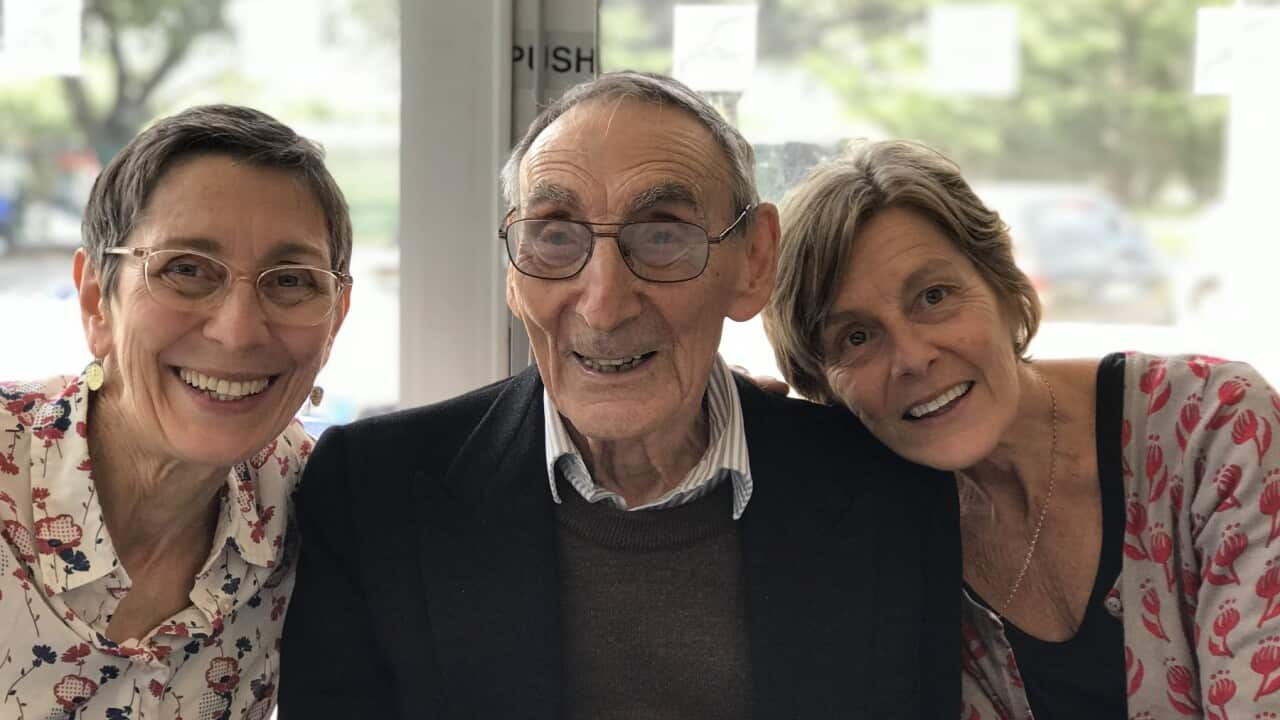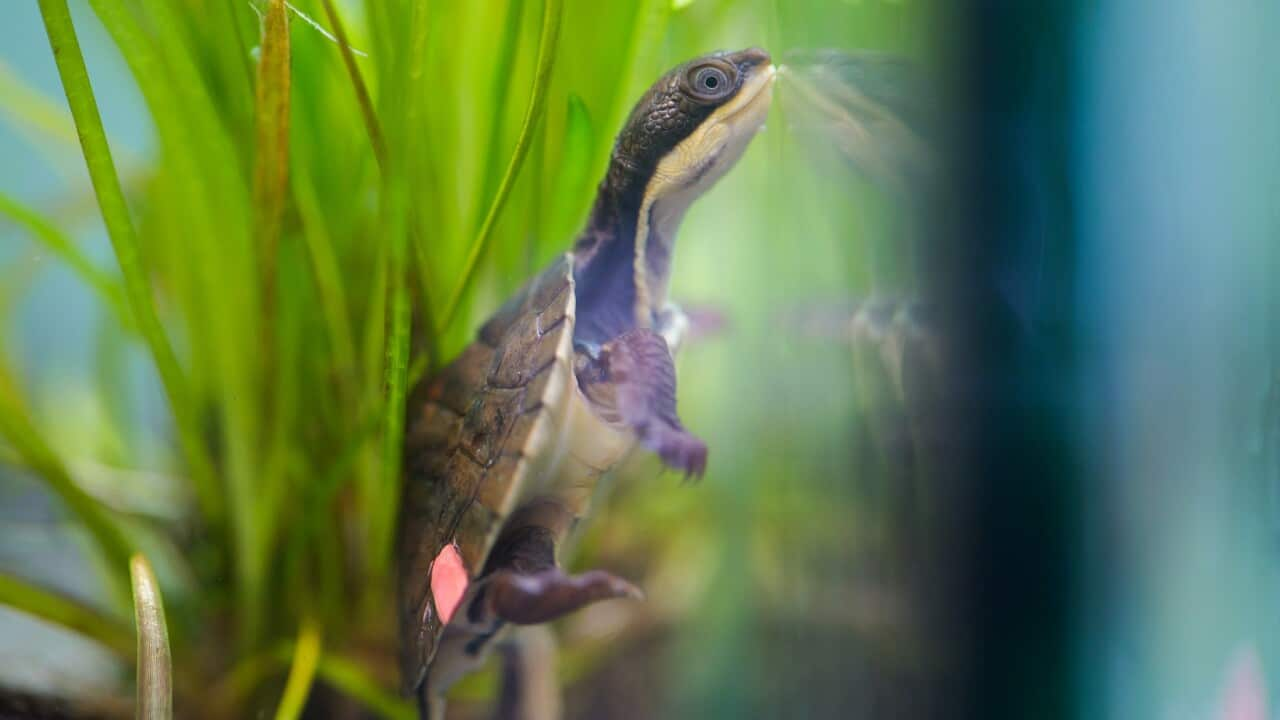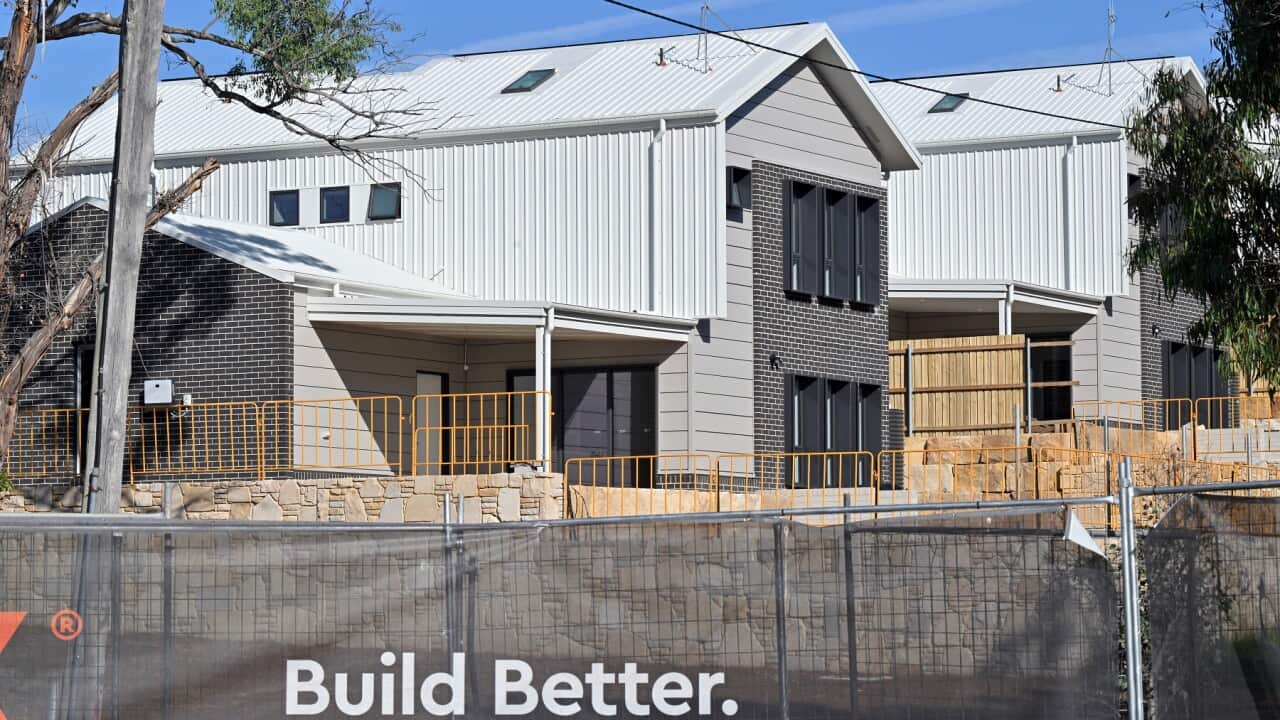Italian
Carolyn Cox ha detto che suo padre Jack Moulos aveva un desiderio prima di morire.
"When we asked him what he wanted for end of life procedures, he said all I want is for someone to hold my hand and that's what we were hoping for, and we couldn't.
Jack è morto lo scorso gennaio a 97 anni, dopo aver contratto il COVID-19.
La signora Cox ha detto che suo padre ha vissuto una vita piena – cambiando carriera negli ultimi anni, e godendosi la pensione.
La signora Cox ha detto che ha imparato molto dalla sua generosità di spirito.
"He was very good at accepting anyone without judgment - and he was very kind. And also I am very happy that he had the pleasure of photography as his creative outlet. And also he changed careers when he was 45 from being in a cafe to being a law librarian and that was very fulfilling for him. But when he retired he immersed himself in the family, and that was just lovely and we were very grateful."
Mentre Carolyn era in isolamento perchè le persone con cui conviveva avevano il COVID - sua sorella Michelle Moulos che vive a quattro ore di distanza ha viaggiato fino a Sydney per provare a vedere suo padre, ma non ce l’ha fatta.
"Then my sister rang and I hung up and said they just called me and said... do you want to pull over? And I said no you can tell me. And she said he just died. I felt because all of us had been through COVID there is this kind of sadness about it but there is also this acceptance that there is nothing you can do and I kept driving. Then I cried and then I said my goodbye to him when I was driving. And I also knew even if I got there when he was alive, I would not have been able to touch his skin anyway."
Jack Moulos è adesso tra i più dei 10.000 australiani che sono morti a causa del COVID-19.
La nazione ha tagliato il triste traguardo la scorsa domenica 3 luglio.
La maggioranza delle morti legate al COVID-19 – il 70 per cento – si sono verificate negli ultimi sei mesi.
Questo dato è in relazione al 2021, nel quale sono morte circa 1300 persone.
L’anno precedente ci sono stati 909 decessi.
Il virologo Nigel McMillan della Griffith University ha detto che se il trend attuale di morti relative al COVID continuasse, l’Australia raggiungerebbe 14.000 decessi entro la fine dell’anno.
"At our current rate from deaths from COVID-19, which is twice for example the current road toll per day, we are going to reach some 14 thousand deaths by the end of the year. That would put COVID-19 at number two or three in the list of causes of deaths. Now that puts COVID at number two behind coronary heart disease"
Una combinazione di sub-varianti Omicron e di pochi controlli, se non nessuno, ha mantenuto alto il tasso di infezioni.
L’epidemiologa Catherine Bennett della Deakin University ha detto che, globalmente, l’Australia sta salendo in cima alla lista dei decessi giornalieri, ma sta scendendo in quelle graduatorie che tengono conto della popolazione totale.
"Thankfully we are never going to catch in terms of the deaths we avoided over 2020-2021. So now we are in this pattern where we will continue to see deaths while we have high infection rates, particularly over winter. We will have death rates that are higher than other parts of the world but hopefully in summer that pattern will reverse and we will see our numbers come right down as well."
Per aiutare ad invertire la tendenza di infezioni e decessi, esperti come Nigel McMillan dicono che si deve fare di più.
"We are not going to go back to lockdowns but we have tools in our arsenal we can use more efficiently. Antivirals are important. But we know that booster shots improve our ability to avoid serious illness and hospitalisation and I encourage everyone to get them."
Ma il dottor McMillan aggiunge che al momento l’Australia sta somministrando antivirali soltanto a persone con più di 65 anni con comorbidità.
Il dottor McMillan pensa che l’Australia dovrebbe allentare quel vincolo, e somministrare antivirali a tutti coloro con più di 50 anni.
Il ministro australiano della sanità Mark Butler ha escluso il ritorno all’obbligo della mascherina, ma ha rinnovato l’appello alle persone di ricevere la terza dose.
"To those almost six million Australians who are eligible but have not yet had their booster shot, get out and get a booster. You are not fully protected against this sub-variant with just two doses of the vaccine. It is critically important people get that third booster."
English
Carolyn Cox says her father Jack Moulos had one wish before he died.
"When we asked him what he wanted for end of life procedures, he said all I want is for someone to hold my hand and that's what we were hoping for, and we couldn't.
Jack passed away in January aged 97 after contracting COVID-19.
Ms Cox says her father lived a full life - making a late career switch, and also enjoying his retirement.
Ms Cox said she learned a great deal from his generosity of spirit.
"He was very good at accepting anyone without judgment - and he was very kind. And also I am very happy that he had the pleasure of photography as his creative outlet. And also he changed careers when he was 45 from being in a cafe to being a law librarian and that was very fulfilling for him. But when he retired he immersed himself in the family, and that was just lovely and we were very grateful."
While Carolyn was in isolation because people in her household had COVID - her sister Michelle Moulos who lives four hours away made the trip to Sydney to try and see her father, but he couldn't hold on.
"Then my sister rang and I hung up and said they just called me and said... do you want to pull over? And I said no you can tell me. And she said he just died. I felt because all of us had been through COVID there is this kind of sadness about it but there is also this acceptance that there is nothing you can do and I kept driving. Then I cried and then I said my goodbye to him when I was driving. And I also knew even if I got there when he was alive, I would not have been able to touch his skin anyway."
Jack Moulos is now among more than 10,000 Australian who've died from COVID-19.
The country passed the grim milestone on Sunday 3 July.
The vast majority of Australia's COVID-19 related deaths - 70 per cent -have occurred in the past six months.
That's compared to 2021, when about 13-hundred people died.
There were 909 deaths the year before that.
Virologist Nigel McMillan from Griffith University says if the current trend in COVID deaths continue, Australia is on track to reach 14,000 fatalities from the virus by the end of the year.
"At our current rate from deaths from COVID-19, which is twice for example the current road toll per day, we are going to reach some 14 thousand deaths by the end of the year. That would put COVID-19 at number two or three in the list of causes of deaths. Now that puts COVID at number two behind coronary heart disease"
A combination of successive Omicron sub-variants, and few to no restrictions, have kept infection rates high.
Epidemiologist Catherine Bennett from Deakin University says globally, Australia is moving up the list on the daily death rate, but is lower on the rankings on a per capita basis.
"Thankfully we are never going to catch in terms of the deaths we avoided over 2020-2021. So now we are in this pattern where we will continue to see deaths while we have high infection rates, particularly over winter. We will have death rates that are higher than other parts of the world but hopefully in summer that pattern will reverse and we will see our numbers come right down as well."
To help turn the tide in infection and death rates, experts like Nigel McMillan are calling for more to be done.
"We are not going to go back to lockdowns but we have tools in our arsenal we can use more efficiently. Antivirals are important. But we know that booster shots improve our ability to avoid serious illness and hospitalisation and I encourage everyone to get them."
But Dr McMillan adds that at the moment Australia is only giving anti-virals to people aged over 65 who have a co-morbidity.
He thinks Australia should loosen that restriction to give to anyone over 50 years-old access.
Federal Health Minister Mark Butler is ruling out any return of mask mandates for the time being, but is again renewing calls for people to get their third doses.
"To those almost six million Australians who are eligible but have not yet had their booster shot, get out and get a booster. You are not fully protected against this sub-variant with just two doses of the vaccine. It is critically important people get that third booster."
Report by Lin Evlin and Peggy Giakoumelos




